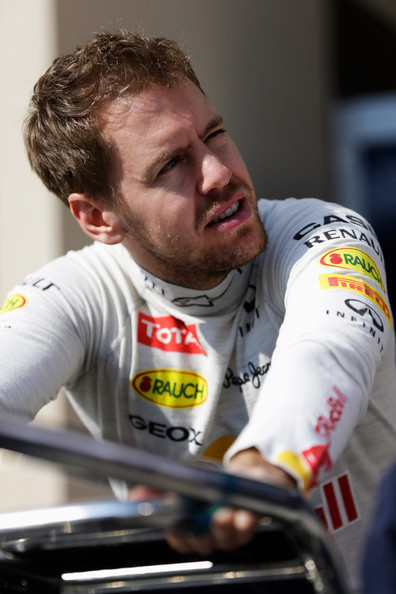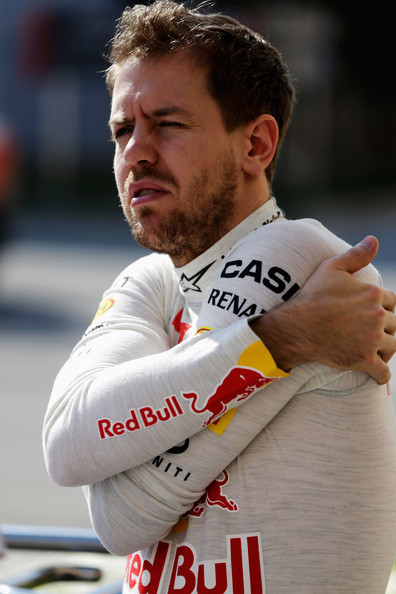Text


Charles today in Monaco, 18.07.25
via to.cst
349 notes
·
View notes
Text

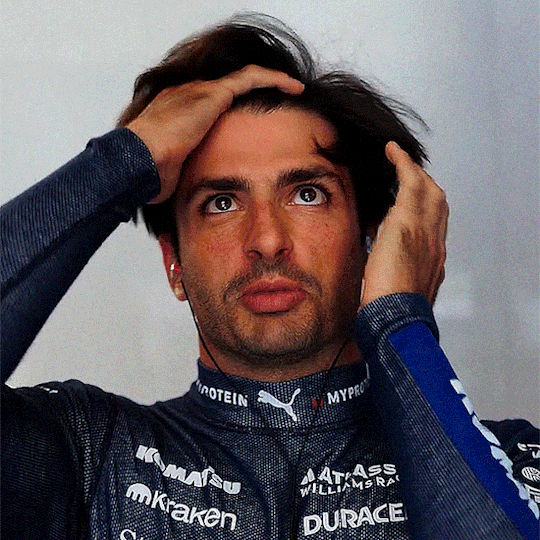
angel 😇🪽👼🏻
396 notes
·
View notes
Text
Is Carlos ok
145 notes
·
View notes
Text

Sebastian Vettel Interview with Auto Motor und Sport [2025-07-17] English Translation ↴
Three years after his retirement, Sebastian Vettel is done with Formula 1, but not with motorsport. And he continues to cultivate his environmental projects.
Shortly after your retirement in 2022, you said in an interview with Der Spiegel: “I would be disappointed in myself if, after two years, I realized that I couldn't do without Formula 1.” Are you satisfied with yourself today? Yes, but it wasn't easy. At the time, I didn't just decide to quit. I also made a conscious decision not to rush into the next task, but to first face a certain emptiness. That's a process that is still ongoing in some ways. It allowed me to immerse myself in this life that was no longer dictated by a schedule. Before, I had a structure that had sustained me my whole life. One racing season followed another. The calendar was fixed, so it was clear when there would be time for something else between races. Even though I thought I was prepared before I retired, it all disappeared overnight. So I was able to use the time to learn a lot about myself. How do I cope with this new life? Who am I when it's not about racing? Even though I have developed other interests, racing is still the dominant theme in my life.
To what extent? I can live without Formula 1, but I still follow it. I may not watch every race live, but I'm still interested. Especially the human element. Seeing the young drivers master the challenge is what's exciting.
How often did you feel the urge to start again yourself? A key moment was the first race I didn't take part in [2023 Bahrain Grand Prix]. It was a bit strange. I had actually planned not to watch it, to put it behind me and have nothing more to do with it. But then I got a bit nervous and couldn't stand it. In the middle of qualifying, I knew exactly what time it was taking place, of course, so I turned on the TV and watched the race the next day as well. I completely narrated what was happening on TV, who was doing what and why, which strategies were working and which weren't.
Who was your audience? My wife and children.
Is that still the case? I've given up commentating in the meantime. But I still enjoy following the races. What I really miss is the competition, those intense moments of having to make important decisions, such as whether to change to a new set of tires or whether the old ones might still be good enough. That's when the moment counts. There are no second chances. It's very difficult to find that intensity in everyday life, even with the interests I have now. Rationally, it's easier for me to accept that this chapter is now over. Emotionally, less so. I don't rule out the possibility of driving again someday.
For example? Formula 1 is over. At some point, the time is right to leave the field to others. You can see that with the rookies right now. I think it's good that a whole bunch of them have been replaced. That's not a vote against the old guys, but one for the young guys. I mean, I didn't care who among the established drivers was no longer racing. The main thing was that I was allowed to race. It's the natural course of things that young drivers come up and replace the old ones, because they may be faster. That doesn't mean that what the others did before wasn't good. It's more a case of natural selection.
You tested a Le Mans Porsche in 2024. Could something come of that? Yes, that was really fun too. To be honest, endurance racing didn't really interest me in the past because of my lone wolf mentality. I see things differently now. I find the team structure, sharing a car, and making compromises really exciting. This discipline has different challenges. I wouldn't rule out the possibility of something coming of it. I'd be lying if I said that Le Mans had always been my dream, but getting to know the team and the drivers and seeing the dynamic that develops there, it would be an interesting challenge. There have been talks, but somehow it hasn't worked out yet. Maybe something will come up in the future. But Formula 1 is off the table, if only because of the time commitment. That was one of the factors in my retirement back then.
What didn't work out with sports cars? A part-time model, which is still possible in other sports, doesn't work in motorsport. I've spoken to tennis players who, at the end of their careers, only played the tournaments they wanted to play. They took part in the Grand Slams and spent three months with their families in between. In motorsport, you can't really say: I'll only drive half the races. The WEC would actually be a good fit with its eight races, which are also staggered differently than Formula 1. It's always a question of how intensively you want to do something. For me, it's always been the case that when I commit to something, I want to do it properly. Just driving a little bit isn't for me.
What would have to happen for you to say yes? The right constellation at the right time, the right partnership, the right outlook.
After his first retirement, Mika Häkkinen said: “The worst thing for me was realizing that I was only mediocre in all other disciplines of life.” How is that for you? I'm fine with it. Bernie Ecclestone once warned me that it would be presumptuous to believe that you can be a world leader in all aspects of life just because you were in Formula 1. It has something to do with humility. That made perfect sense to me then, and it still does today. You have the same drive to do something well, but you quickly realize that you either lack the talent for something else or you're starting too late.
Helmut Marko has mentioned you as his successor at Red Bull. Would that be something for you? I know Helmut very well, and we are also in contact. If it really became more concrete, I would first have to be aware of what kind of task I would be facing. A decision would depend heavily on that. Based on my experience and profile, I certainly have a certain level of expertise.
Are next year's engine regulations going in your direction? No.
Despite 50 percent electrification and synthetic fuel? The 2014 regulations were good in theory, but the implementation was not right. It cost far too much money and did not benefit the series. The 2026 regulations are suffering the aftermath of this. Innovative solutions from the previous engine regulations are being dispensed with in order to make it less expensive. The aim is to attract new manufacturers. The electrical component is generally good. It is also needed in mobility. On the road, we are already further ahead with 100 percent electric mobility. However, motorsport has different requirements. At the 24 Hours of Le Mans, these are very different from those in Formula 1 or in the junior classes. Either way, it won't work with fully electric drives. If we stick with Formula 1 for now, I'm not entirely convinced by the new regulations. Recovering energy is great, but doing it only on the rear axle and ignoring the front axle doesn't make sense to me. I also think synthetic fuels are a good idea because there is a demand for them outside of motorsport. For the many vehicles that are already on the road. For shipping and aircraft. What you have to be careful about is the origin of these fuels. If you let the typical Formula 1 development race loose on this, it can quickly go in the wrong direction, as was the case in 2014. Formula 1 always tries to go to extremes. When it comes to fuels, you should close the door far enough to limit the origin of the molecules and establish a certain degree of series relevance. From a driver's point of view, it would also be important to reduce the weight. We are now moving in that direction a little, but it's only a drop in the ocean.
What would your ideal Formula 1 engine look like? It always comes down to: What are you trying to achieve? How do you achieve it? Where do the funds come from? With the current engine, there is no transfer to series production except for the “hybrid” sticker, because the technology is too complex and too expensive. From a sporting perspective, the competition must be as close as possible without damaging the spirit of Formula 1. And people must still be able to afford the sport. But you also have to see and take advantage of the signs of the times. It's no longer just about driving around in circles as fast as possible. A Grand Prix is a major event with a large audience. This allows me to explore many new topics. How do I get spectators to the track and back again? What do people consume at the track? Where do these things come from? How do they contribute to making it a great event? Formula 1 is not just an event for a handful of car manufacturers, but also for completely different partners. When you add it all up, you end up with synthetic fuels and an engine formula that is not a legacy of the current drive system, but takes a step back because it is much cheaper and at the same time generates enthusiasm. I was lucky enough to experience how a V10 feels and sounds. And that's part of this show and the Formula 1 experience. In the past, people didn't just go to the racetrack to see who would win. They also wanted to soak up all the fascination surrounding it.
Would your children still be excited about a loud, screeching V10? They didn't know it like we did. Yes and no. I do believe that a generation is growing up for whom the V10 sound is no longer as important as it was for us. But they could still be enthusiastic about it. The question is whether the engine formula has to be relevant to series production. I don't think so. Series production has long since overtaken Formula 1. It will move more in the direction of entertainment. We have to stick to what we know, but it has to be done better in terms of the environment. The shoes I buy have to be manufactured in a way that doesn't harm the environment and that production meets fair working conditions. The same applies to cars and motorsport events. The awareness is different there. It would be a shame if the motorsport we know ceased to exist. It's perfectly normal for it to change.
You used to be a hardliner; nothing was ever V10 enough for you. That has changed completely. Now you're more into the green wave. Was there a key moment, or was it a gradual process? There was no key moment. It was more of a discussion that grew and grew, a wave that reached us all. It swept me along. When you have children, the term “future” takes on a whole new meaning. For the first time, I had the future in my hands. Before that, it was harder to grasp. With children, you simply think more about the world, whether it is still safe and how long it will remain livable. The same applies to politics. I used to not be interested in it at all, and today I find it totally exciting. Everything is somehow connected, some things indirectly. Mobility, events, biodiversity.
You are involved in many campaigns and are now also launching your own environmental and social projects under “V5 Projects.” Are the topics brought to you, or do you choose them yourself? I usually choose them myself. They are always things that interest me personally. Through the topic of the environment, I have also become more aware of the social component. You realize that behind every problem there is a solution. Behind the solutions are people who are affected, for better or for worse. Some have already benefited from the change, while others have not yet seen it. There are enough problems, and I find it extremely exciting to look into different areas and learn something new each time. The #Race-forWomen Challenge campaign, in which we organized kart training for young women in Saudi Arabia, was also enlightening for me. Normally, you go to a country like that with preconceptions and think that everything there is bad. Then you talk to the women and find out that their dreams are the same as ours. I think it's only fair to listen to them and give them a platform. The goal is not to turn them into Formula 1 drivers. It's about them feeling the freedom behind the wheel, deciding for themselves which line to take. That can contribute to so much more in real life.
And how did you get involved in the Bee Wild project with DEKRA? Why bees and not rhinos or elephants, which might attract more attention when it comes to species conservation? Bees are very good ambassadors. What stuck with me is that without pollination, there would be no fruit, no vegetables. Many people initially think of honey bees, which are released by beekeepers to pollinate fields and meadows. But that's not the problem. They are not threatened with extinction. It's more about wild bees and other insects, which are being pushed back more and more. This was also the focus of the #BuzzingCorner project I initiated at the Grand Prix in Japan. Here, we simply brought the topic of biodiversity to motorsport and the racetrack. As mentioned above, Formula 1 must also recognize and take advantage of the signs of the times and explore many new topics.
79 notes
·
View notes
Text















carlos sainz x “mad dog” by the crane wives
#IM GONNING TO FREAK OHT#STOPPPPP IT !!!!!!!!!! STOP THE MADNESS !!!!!!!!!!!!!!!#carlos sainz#amazing art
129 notes
·
View notes
Text
it's messed up that men with long hair can just cut their hair and then no longer be a man with long hair
45K notes
·
View notes
Text
it’s not clocking to you that he’s standing on business
22 notes
·
View notes
Text
gathers mutuals like Jesus did for the last supper : one of you will block me
3K notes
·
View notes
Text
Interview with Sebastian Vettel: Le Mans WEC Comeback

Vettel considers start at Le Mans possible Sebastian Vettel has ended his active career. According to his own statement, the Heppenheim native is no longer aiming for a comeback in Formula 1. Instead, the four-time world champion is putting out feelers in the direction of the WEC and Le Mans. Sebastian Vettel is keeping his options open for competing in the 24-hour race at Le Mans and in the FIA World Endurance Championship (WEC) from next year. He has decided against taking part this year. But: "I don't want to rule out that something will come of it," said Vettel in an interview with Auto Motor und Sport. "There have been talks, but somehow it hasn't worked out yet." However, Vettel is becoming increasingly enthusiastic about endurance racing. "In the past, I honestly wasn't that interested in endurance racing from my perspective as a lone fighter. Today I see it differently. I find it totally exciting, this team structure, sharing a car, making compromises." In addition, the WEC does not take up the whole year like Formula 1. "In motorsport, it's hard to say: I only drive half of the races. The WEC would actually fit in well with its eight races, which are also staggered differently to Formula 1," said Vettel. Formula 1 chapter closed After retiring from Formula 1 at the end of the 2022 season, Vettel prioritized private projects and his family. Now he is obviously itching to get going again: "It's always a question of how hard you want to do something. For me, it's always been the case that I want to do it properly when I get involved in something. Just going along for the ride is not for me." When asked what would have to happen for him to commit to a WEC team, Vettel replied: "The right constellation at the right time, the right partnership, the right outlook." A return to Formula 1, on the other hand, is not conceivable for Vettel. "Formula 1 is finished. At some point, the time will be ripe to leave the field to others. You can see that with the rookies. I think it's good that a whole bunch of them have now been replaced. It's not a vote against the old, but in favor of the young. In the past, I wasn't interested in which of the established riders no longer raced. The main thing was that I was allowed to drive."
89 notes
·
View notes
Text


via ribeiravirginia
299 notes
·
View notes
Text



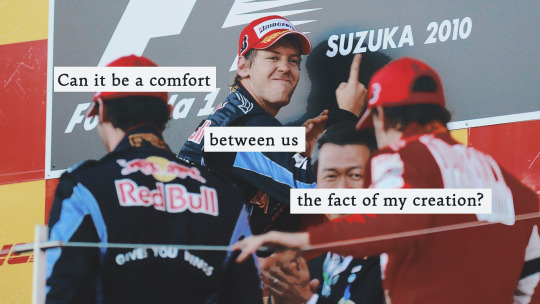

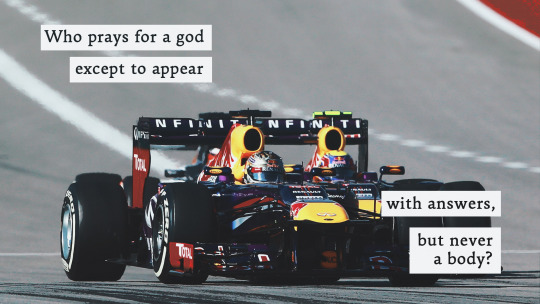

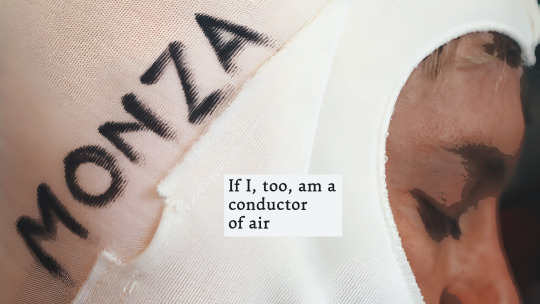


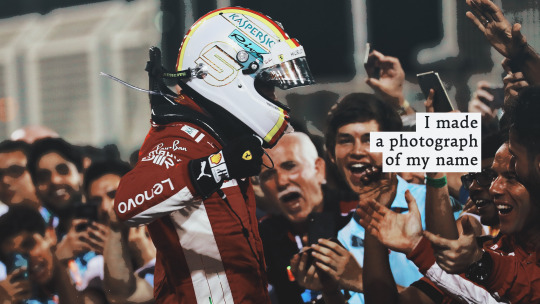
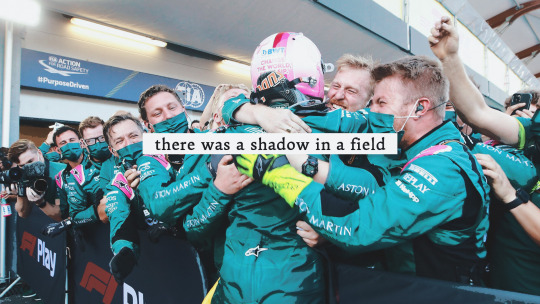


Portrait of My Gender as [Inaudible] By Meg Day
for @racingliners
105 notes
·
View notes





